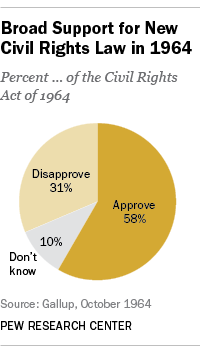“Injustice anywhere is a threat to justice everywhere.” – Martin Luther King Jr.
The civil rights movement had significant consequences for the United States of America which. Studying the causes of the appearance of this social phenomenon can give a more detailed insight into it. Until the sixties, many representatives of the black community did not have significant rights and were greatly belittled. Thus, this work aims to study the cause and effects of the civil rights movement. Among the main initiating factors, one can single out unequal and unfair treatment of the black community. The consequences are the cessation of discrimination, the introduction of legislative acts, and the general desegregation of American society.
The civil rights movement of the African-American population is particularly valuable for the country. These disturbances were most widespread in the 50s and 60s. Despite the fact that the Civil War became the main lever to abolish slavery, however, the unfair treatment of blacks did not end. African Americans continued to face biased and sometimes violent actions toward them. The protest for the rights of black people consisted of multiple peaceful and non-peaceful protests and speeches by activists, the most prominent of which was Martin Luther King Jr. (Bass, 2021). The main goal that people wanted to achieve was the creation of legislation to end segregation, Black voter suppression, and discrimination. The latter had a particularly negative impact on the sphere of hiring and housing practices. Therefore, the civil rights movement expected the primary outcome to be the formation of laws that would be fair to the black community in all spheres of society.
Further, the first aspect that needs to be considered is the reasons why the civil rights movement has become so active. The fact that equal rights of all residents of the United States are enshrined in the legislation of the United States caused particular indignation. Despite this, black representatives still felt pressure from the more privileged strata of society. This has become one of the root causes of the pursuit of the rights of black citizens.
Therefore, the desire to achieve the same civil rights was also provoked by the postulates of democracy and the Declaration of Independence. These aspects proclaimed human rights as the basis of everything. Neither social status, race, nor any views and worldviews could interfere with this right. Another critical reason was the failure of Reconstruction of the late 19th century, which provided constitutional guarantees of formerly enslaved people’s legal and voting rights (Rosen, 2018). Despite all these features, many of them ceased to play an important role at the moment when the United States was involved in a military conflict with Vietnam. Thus, the change of emphasis of the government contributed to the establishment of the superiority of the white population. This happened as a result of the suppression of black voting rights and the creation of the Jim Crow segregation system.
All these factors influenced the establishment of the civil rights movement, and it is necessary to investigate further its effects. First of all, it greatly affected the society of the United States of America. One of the main achievements related directly to the legislative side was reflected in two major civil rights laws passed by Congress. These laws became The Civil Rights Act of 1964 and the Voting Rights Act of 1965, which were supported by the public (Fig. 1) (Schuit & Rogowski, 2017; Weiss, 2019). The main contribution of these legislative innovations was the provision of constitutional rights for African Americans and granting them the right to vote in political elections. Moreover, it has significantly improved the life of the black community and granted them much more rights and freedoms, despite the presence of still substantial negative phenomena.

In addition, one of the effects was that the provision reinforced the rights of citizenship, which was provided to the black population. It is worth noting that the granting of the right to vote and participate in elections also gave more and more black representatives the way to speak in them. The most important event was the election of the first black president Barack Obama in 2008 (Sides et al., 2017). Similarly, it affected other government offices when African Americans became officers and politicians. Critical outcomes of the civil rights movement were the provision of educational opportunities for black children and adults. Improving people’s skills has become an opportunity for them to get prestigious jobs and respected places. The positive factor in this expansion of rights was an increase in the level of wages and a decrease in discrimination against African Americans.
Therefore, this work considered the causes and effects that followed the development and strengthening of the civil rights movement. The main reason was discontent due to discrimination and unequal treatment of blacks by the legislation and society. Hence, it considered the importance of these actions for the empowerment of the African-American population. In conclusion, it should be said that all the positive and active actions, strategies, and procedures applied have influenced the granting of equal rights in employment, education, the opportunity to participate in elections, and the provision of social benefits.
References
Bass, S. J. (2021). Blessed are the peacemakers: Martin Luther King Jr., eight white religious leaders, and the “Letter from Birmingham Jail”. LSU Press.
Kohut, A. (2020). From the archives: 50 years ago: Mixed views about civil rights but support for Selma demonstrators. Pew Research Center.
Rosen, D. A. (2018). Slavery, race, and outlawry: The concept of the outlaw in nineteenth-century abolitionist rhetoric. American Journal of Legal History, 58(1), 126-156.
Schuit, S., & Rogowski, J. C. (2017). Race, representation, and the voting rights act. American Journal of Political Science, 61(3), 513-526.
Sides, J., Tesler, M., & Vavreck, L. (2017). The 2016 US election: How Trump lost and won. Journal of Democracy, 28(2), 34-44.
Weiss, J. T. (2019). Civil Rights Act of 1964, Title VII. The Encyclopedia of Women and Crime, 1-3.